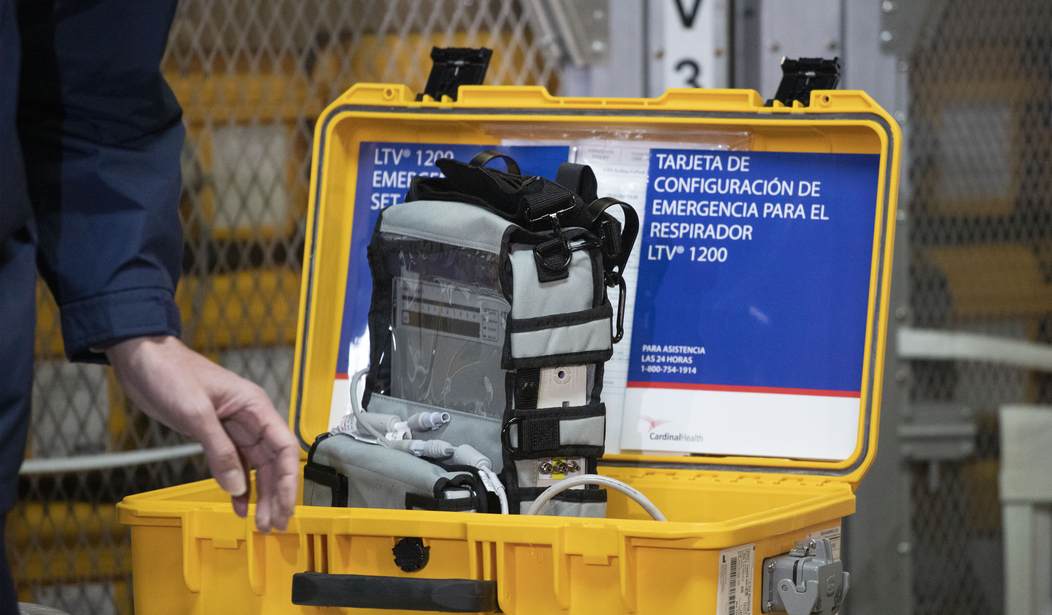Unused medical supplies and PPE ordered by the City of New York during the height of the pandemic are now being sold for pennies on the dollar, according to a bombshell report.
City officials have auctioned off the gear that cost taxpayers about $224 million, but have only recouped $500,000.
Among the items sold were nearly 3,000 mechanical ventilators hailed by former New York City Mayor Bill de Blasio. The items—described for auction as “non-functioning medical equipment for scrap metal,” cost taxpayers $12 million, but were sold for just $24,600 last month.
“This is a story about doing the impossible,” de Blasio said of the “bridge vents” in 2020. “We’d never made a ventilator before — and so we made thousands. We learned it would take a year — and so we did it in a month. Our City is taking our future into our own hands. That’s how we’ll beat this crisis and prepare for the next.”
Twenty-eight truckloads later, a Long Island junk dealer has taken them off the city’s hands.
But that’s not all the city has been trying to sell and city officials expressed concern over the summer that if the public found out, it would lead to an investigation into “over-buying during COVID.” To get ahead of any bad PR, the Department of Citywide Administration Services, which is overseeing the sales, has created talking points in “direct consultation” with Mayor Eric Adams’ office, “to address why the city is auctioning off PPE while Covid cases continue to persist.”
An investigation by THE CITY has determined that since last summer, the Department of Citywide Administrative Services (DCAS) has systematically tried to auction off millions of dollars worth of COVID-related personal protective equipment (PPE) and medical supplies — gowns, face shields, hand sanitizer, KN95 masks, N95 masks — that the department decided are no longer needed. Many of these supplies remain in their original packaging and are brand-new.
THE CITY was able to connect specific auctions to 20 COVID-related medical supply contracts and confirmed the sales with a source familiar with the agency’s auction efforts who spoke to THE CITY on the condition of anonymity. About 9.5 million items purchased by the city government from $224 million in COVID-related contracts at the pandemic’s 2020 peak have been auctioned so far, garnering about $500,000.
That comes to 5 cents per item. Many other COVID items have remained unsold after going up for auction, with no bidders biting.
In one round last summer, only two of 24 auctions yielded sales. Even then, bidders paid $194,000 for goods originally bought for $980,000, according to internal DCAS emails. (THE CITY)
Recommended
According to THE CITY report, officials grossly overpaid (in at least one case to a major Democrat donor) for some items because typical government oversight measures were not in place.
Much of this big sell-off is occurring because de Blasio waived the usual good government oversight of city contracts at the start of the pandemic. Former city Comptroller Scott Stringer, whose job was to make sure that the city gets what it’s paying for, was sidelined.
Earlier this month, his successor, Comptroller Brad Lander, issued a report noting that despite the pandemic, city agencies still had the responsibility to vet the credibility of vendors to see if they would deliver what they promised and if the prices offered were reasonable.
Lander found that both of those efforts were spotty at best, and the City of New York wound up paying upfront for millions of dollars’ worth of defective goods or supplies that were never delivered.
The comptroller zeroed in on Digital Gadgets, an electronics firm run by Charlie Tebele, a major donor to de Blasio, who appointed Tebele to EDC’s board after the city ramped down its COVID purchases. Digital Gadgets was prepaid $9.1 million for ventilators that it failed to deliver, so the city applied that payment to surgical masks the company did supply. But Digital’s initial delivery of N95 masks were of “poor quality or not FDA-certified,” and were sold to the city for $4 a piece — well above the average per-mask price of $3.10, Lander found.
In many cases, in fact, the city paid absurdly inflated prices. A company called Fastenal sold the city 50,000 face shields at $6.70 per shield when the average price at the start of the pandemic was $3.67, the comptroller found. That means taxpayers paid $335,000 for items that on average should have cost $183,500.
On Valentine’s Day, DCAS put up for auction a lot containing 701,100 face shields, with an opening bid of $1,000. That’s less than one penny per shield. (THE CITY)
When asked on Tuesday about the auctioning of items, Adams pointed to the city's charter requiring surplus items be sold after 90 days.
"After that 90-day, we have to make the determination, of my understanding, either to auction it off, give it away, or discard it," he said. "That's just a bad rule. And so, as you stated, hundreds of millions of dollars will auction off for $500,000."
He hoped to get the rule changed.
“COVID created an environment that none of us expected and so, we had to purchase far more than what we would have traditionally purchased," Adams added. “So, somewhere in the charter rule, we need to state that under certain circumstances, we are not forced with, ‘Hey, it’s 90 days, let’s get rid of this stuff, no matter what the cost is that’s associated with it.'”

























Join the conversation as a VIP Member